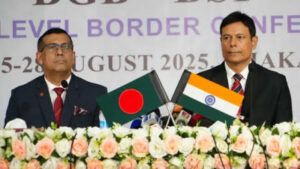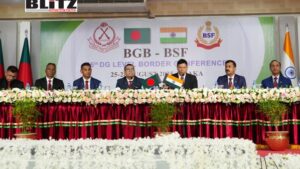India, Bangladesh to curb border killings
Bangladesh and India have agreed to stop killings, smuggling, and illegal intrusion at the borders, alongside repatriation of nationals following due legal process, and to refrain from undertaking development schemes within 150 yards of the zero line.

The agreement came in a joint statement issued on Thursday by Border Guard Bangladesh (BGB) and the Indian Border Security Force (BSF) upon completion of the four-day director general (DG)-level border conference at BGB Headquarters in Pilkhana, Dhaka.
Director General of BGB Major General Mohammad Ashrafuzzaman Siddiqui led the 21-member Bangladesh delegation, while BSF Director General Daljit Singh Chawdhary led the 11-member Indian delegation. The chiefs of both border guards expressed satisfaction with the outcome of the conference. They reaffirmed their commitment to work jointly to maintain peace and stability along the border.
The Bangladesh delegation included senior BGB officials as well as representatives from the Office of the Chief Adviser, Home Ministry, Foreign Ministry, Shipping Ministry, Roads and Highways Department, Department of Land Records and Surveys, Joint Rivers Commission, and Department of Narcotics Control.
The Indian delegation included senior BSF officials, representatives from the Ministry of Home Affairs, Ministry of External Affairs, and officials from the Indian High Commission in Dhaka. During the meeting, the BGB chief expressed deep concern over indiscriminate shootings and killings of innocent Bangladeshi nationals by BSF and Indian citizens along the border.

In response, the BSF chief reiterated his commitment to preventing the recurrence of border killings by adopting additional precautionary measures and intensifying night patrols in vulnerable border areas.
Both sides agreed to undertake joint awareness programs, implement socio-economic development initiatives in vulnerable areas, promote respect for border sanctity, and prevent cross-border movement of criminals, with the objective of reducing such incidents to zero.
The BGB DG also raised concerns over illegal push-ins of individuals, Indian nationals, and forcibly displaced Myanmar nationals into Bangladesh by the BSF. He emphasized adherence to established procedures for repatriation of illegal entrants.
In reply, the BSF DG assured that Bangladeshi nationals residing illegally in India would be repatriated following mutually agreed processes.
Highlighting the importance of the Coordinated Border Management Plan (CBMP) in curbing the menace of smuggling various types of drugs and narcotics, firearms, ammunition, explosives, gold, fake Indian currency notes, and other contraband items, both sides agreed to remain cautious and steadfast in stopping smuggling through sharing of real-time information, investigation reports of traffickers, and heightened vigilance to curb such crimes.
Both sides also agreed to take effective measures to prevent border residents from engaging in cross-border crimes such as illegal intrusion, smuggling, human trafficking, breaching of border pillars, and other transboundary offences. They reaffirmed their commitment to maintaining the sanctity of the international border.
At the meeting, both Bangladesh and India agreed not to undertake any development activities within 150 yards of the zero line without prior approval and to expedite completion of ongoing development works in border areas.
Both sides also agreed to facilitate Joint Rivers Commission-approved riverbank protection works and to prevent unauthorized activities in common rivers along the border.
Regarding the Connected Bangladesh Project to expedite completion of the installation of optical fibre networks connecting Dahagram through the Tin Bigha Corridor, the BSF DG assured that the issue would be placed before the concerned ministries and agencies of India for resolution.
Both delegations reiterated their “zero tolerance” stance against any armed insurgent groups operating across the border and agreed to take necessary measures to prevent terrorist activities through real-time information sharing.
The BGB DG stressed the need for permanent construction of border pillars at Muhurir Char in Feni and the demarcation of the border along the Ichhamati, Kalindi, Rainmangal, and Hariabhanga rivers.
The BSF DG assured that these matters would be referred to the relevant ministries and agencies of India for resolution. Both sides agreed to refrain from any kind of airspace violation.
To avoid misunderstandings in the future, both sides consented to share real-time information regarding pre-scheduled flights and keep each other informed.
Bangladesh and India also agreed to advise their respective media not to spread contradictory or misleading propaganda or rumours against each other that may create tension along the border.
|Also Read : PM Modi heads to China after Japan visit for SCO Summit in Tianjin |
|Also Read : Bangladesh, India conclude 56th BGB-BSF border conference in Dhaka with pledges for peace and cooperation |













